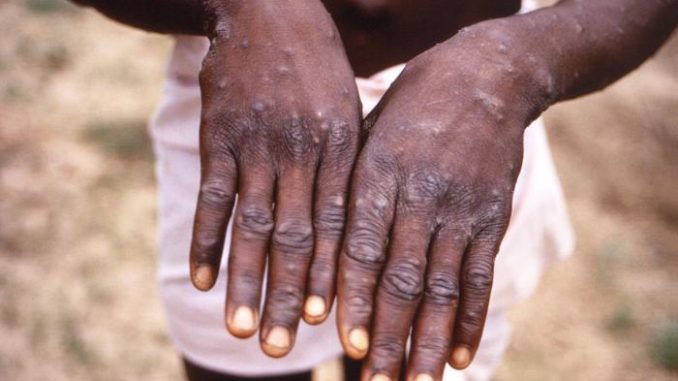
Monkeypox has been discovered in the UK for the first time ever, Public Health England have said.
The rare viral infection was recorded on Friday in a Nigerian national staying at a naval base in Cornwall.
The patient was transferred to the expert infectious disease unit at the Royal Free Hospital in London on Saturday morning.
They are believed to have contracted the infection in Nigeria before travelling to the UK.
PHE said monkeypox does not spread easily and most patients recover within a few weeks, but it can cause severe illness in some people.
Initial symptoms include fever, headache, aching muscles, backache, swollen lymph nodes, chills and exhaustion.
A rash can also develop, usually starting on the face before spreading to other parts of the body. It eventually forms a scab which falls off.
PHE said that as a precautionary measure, it is working with experts in the NHS to contact a number of people who were on the same flight as the patient.
What is monkeypox?
Monkeypox is a rare viral infection that was first discovered in monkeys in 1958. The first case in a human was discovered in the Democratic Republic of Congo in 1970, and since then the disease has been reported in central and west African countries.
The disease, while similar to smallpox, is not as deadly. Early symptoms include fever, headache, muscle aches, swollen lymph nodes, chills and exhaustion. Within one to five days a rash develops.
Monkeypox does not spread easily between humans but may happen when someone comes into contact with monkeypox scabs, clothes used by an infected person, or coughing and sneezing of someone with monkeypox.
Most people who contract the disease recover within a few weeks, but in up to 10 per cent of cases it is fatal.
Source: Public Health England
The body has not revealed whether the patient is a member of the military, or confirmed their gender.
PHE said in a statement: ‘People without symptoms are not considered infectious but, as a precaution, those who have been in close proximity are being contacted to ensure that if they do become unwell they can be treated quickly.’
The organisation said passengers that are not contacted need take no action.
Dr Michael Jacobs, clinical director of infection at the Royal Free Hospital, said: ‘Monkeypox is, in most cases, a mild condition which will resolve on its own and have no long-term effects on a person’s health.
‘Most people recover within several weeks. It is a rare disease caused by monkeypox virus, and has been reported mainly in central and west African countries.
‘It does not spread easily between people and the risk of transmission to the wider public is very low.
‘We are using strict isolation procedures in hospital to protect our staff and patients.’
Dr Nick Phin, deputy director of the National Infection Service at PHE, said: ‘PHE and the NHS have well established and robust infection control procedures for dealing with cases of imported and infectious disease and these will be strictly followed to minimise the risk of transmission.’
END

Be the first to comment